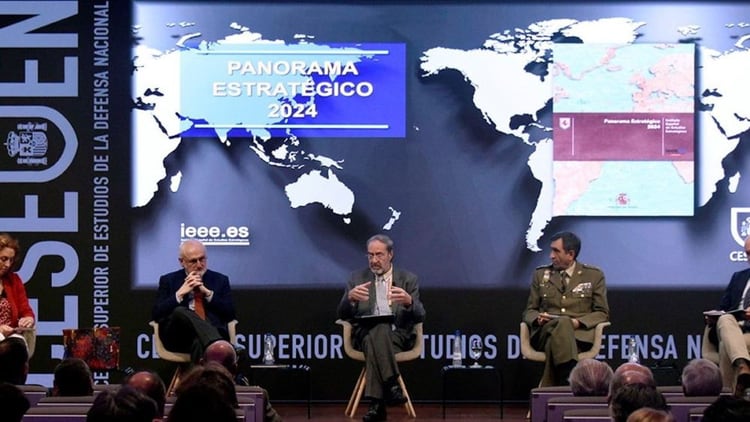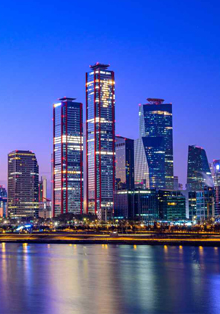Antonio M. Figueras / Escudo Digital
Neither history has ended nor the international order remains unchanged. Quite the contrary. Relations between blocs or countries are marked by uncertainty, by the conviction that we are witnessing new times of complicated resolution.
The Centro Superior de Estudios de la Defensa Nacional (CESEDEN) hosted the launch of the book Panorama Estratégico 2024, published by the Instituto Español de Estudios Estratégicos (IEEE), which analyses the current situation. The event was presented by Lieutenant General Miguel Ballenilla y García de Gamarra, Director of CESEDEN, and a round table discussion was held, moderated by the journalist and professor of International Relations at the Complutense University of Madrid, Felipe Sahagún, president of the working group and writer of the introduction.
The authors of the chapters Florentino Portero, José Pardo de Santayana, Águeda Pérez and Ignacio Álvarez-Ossorio participated in person. Videos of Strategic Panorama 2024 contributors Raimundo Robredo Rubio and Erika M. Rodríguez Pinzón were also shown.
Everything is less predictable
‘There is a lot of current in the system, a lack of clarity about the direction in which the world order is evolving. The balance of power is shifting very rapidly, almost live. A number of conflicts that were dormant have surfaced. Everything becomes less predictable and, therefore, fear emerges’. Felipe Sahagún’s introduction to the book includes these devastating words by Harsh V. Pant, vice-president of the Centre for Indian Studies. Pant, Vice-President of the Indian think tank Observer Research Foundation, to illustrate the situation on the planet.
The impact of five years of trade war between China and the United States, two years of fighting between the armies of Russia and Ukraine, and the new explosion of violence in the Middle East have heightened geopolitical risk and further inoculated international trade and global supply chains with uncertainty, he argues.
On Gaza, Sahagún asks several questions: Will the Biden Administration be able to stop the war; will Israel succeed in destroying Hamas without becoming an international pariah for the slaughter of civilians; how long will the Palestinian leadership responsible for the indiscriminate attack on Israel on 7 October and the Israeli leadership that, for years, facilitated Hamas in dividing the Palestinians survive in power; who will manage the territory when the war ends if Israel continues to refuse serious negotiations for peaceful two-state coexistence; and who will manage the territory when the war ends if Israel continues to refuse serious negotiations for a peaceful two-state solution?
Also on Ukraine, he asks: ‘Will 2024 be the year when the West abandons Ukraine, as Russian President Vladimir Putin has been claiming since before the invasion on 24 February 2022, without waiting for the results of the November presidential elections in the US?
He also underlines how the battlefront has changed. The massive use of drones, increasingly cheaper and more accurate, with the integration of artificial intelligence, is changing the way war is waged. Were it not for these devices, plus missiles and satellites, the war would look more like World War I than the conflicts of the early part of this century.
The US elections are seen as the most decisive factor in 2024. This is why the book opens with the chapter ‘The foundations of US foreign policy’, written by historian and international relations analyst Florentino Portero.
The features of its political culture, democracy and anti-imperialism, help Portero to explain many of the profound differences and contradictions between the US and its allies today: isolationism and defence of the nation state after World War I and international leadership in the construction of a new order after World War II.
Portero refers to the failed US attempt to expand the ‘liberal order’ to the rest of the world in the 1990s: ‘America’s inability to maintain its plans over time convinced the enemies of the “liberal order”, states or groups, of the advantages of confronting the Western powers through irregular conflicts and asymmetrical strategies, converting the military battlefield into a secondary one, subject to the main one: public opinion’. In addition, military relations with European allies are a drag on the relationship due to differences over nuclear deterrence and unequal burden-sharing.
The unintended effects of globalisation led, under Obama, according to Portero, to a ‘retreat of US foreign policy’ and led, after Trump’s surprise victory in 2016, to ‘a deeper rethinking of the country’s presence in the world’.
The author argues that Biden’s major initiatives to keep the US as the leading actor in the digital revolution are working, but ‘the next and most important step, the link between economics and security, is not taking hold’.
The battle for influence
In the chapter ¡Revisionist Powers and the Global South’, Colonel José Pardo de Santayana, acting director of the IEEE, argues that, so far, the People’s Republic of China and the Russian Federation are winning the battle of influence and are benefiting from the lack of sensitivity of Western powers in their relations with developing world countries. Reasons, according to the author: ‘By Washington proposing a crusade of values, perceived as Western and not their own, and by demanding that others conform to an international order in the shaping of which they have barely participated, the countries of the Global South feel treated with a paternalism that disregards their legitimate aspiration to be treated as equals’.
He recalls that until 2017, when the US National Security Strategy (NSS) recognised great power rivalry as its primary concern, optimism had dominated in Western capitals and it was believed that the world was inexorably moving towards liberal and democratising globalisation.
The international order in place since the end of the Cold War, based on multilateralism and presided over by the United States, ‘has given way to an acrimonious multipolar system characterised by growing rivalry between the great powers and in which the scenario of a possible serious clash is already being played out’.
Conclusion: what we know today as the Global South has become a major theatre of operations in the great geostrategic dispute over the configuration of the future international system. These nations have created a context favourable to the strategic designs of China and Russia. For years, Beijing and Moscow have been cultivating and deepening their relations with developing countries: China, mainly through the New Silk Road; Russia, with its energy and arms trade and its active diplomacy.
The challenge of artificial intelligence
Águeda Parra Pérez, PhD in International Relations, engineer and analyst of China’s geopolitical and technological environment, addresses in the chapter entitled ‘Diplomacy of critical minerals’, challenging AI and the battle for climate change: global challenges that will mark decades the protection of the environment, which in her opinion is ‘the challenge with the greatest impact’, the production and access to the minerals necessary for the great energy transition and artificial intelligence (AI), the driving force behind one of the most significant social changes of recent decades. ‘The impact of AI on the geopolitics of technology will also be one of the most challenging dynamics of change in the construction of future balances of power in a geopolitics in transition. Compared to previous advances, which took decades to consolidate, the impact of AI will take a dizzying course.
The author reflects on the imbalance in scientific research and investment in AI, with China outstripping Europe in both areas. The US leads in venture capital investment, raising concerns about Europe’s competitiveness in the technology race.
While AI and access to critical minerals, such as lithium, are immediate challenges for the energy transition, Parra believes that ‘climate change is the most important long-term global challenge, as it will require more decades of investment in green energy than the time that oil has been the main driver of the economy’.
It also details the financial challenges of meeting the needs of the transition: ‘Achieving net-zero emissions by 2050 will mean raising investment to $4.5 trillion per year from the early 2030s, up from $1.8 trillion in 2023.
It also shows the latest US restrictions on China in chips and Chinese countermeasures, which limit the export of gallium, germanium and so-called rare earths (seventeen chemical elements with unique magnetic and optical properties). The author warns that we are in a race against time to ‘adapt better and faster to a model of globalisation in transition where mineral diplomacy is gaining momentum in bilateral relations’.
Far from Africa
Raimundo Robredo Rubio, Spanish ambassador to South Africa, writes the chapter ‘Waiting for the Barbarians’, which alludes to the novel by South African Nobel laureate John Maxwell Coetzee, which in turn takes its title from a poem by Cavafis, in which senators, praetors and consuls meet in the forum to discuss the imminent arrival of the barbarians at the city gates.
The author notes that the relationship between Africa and Europe is deteriorating, a circumstance that other powers are taking advantage of to strengthen their presence on the continent. The European Union’s (EU) actions have not borne fruit. On the political front, democracy and human rights have been promoted by funding and supporting local civil societies and sanctioning serious violators. On the economic front, Economic Partnership Agreements (EPAs) have been signed and development assistance provided. On the security side, training missions have been deployed or African Union (AU) missions have been financed.
To recover the links, Robredo makes several proposals: ‘On the political level, I believe that the EU (and Spain with it) should begin to conceive its values as long-term interests, to work with the population and not with its governments, while the dialogue with each specific government is more transactional, focused on short- and medium-term interests. It is not about putting interests before values, as China or Russia, for example, do, but about articulating them in such a way that they reinforce rather than cancel each other out. In terms of the economy, Robredo advocates technical support and the promotion of African integration. And in terms of security, he advocates ‘African solutions to African problems’, as called for by the AU.
Latin America’s international position
Erika M. Rodríguez Pinzón, PhD in International Relations, professor at the Complutense University of Madrid and special advisor to the EU High Representative, deals with the chapter ‘Latin America, the challenge of a new model of international integration’. In the text, she stresses that the region is ‘trying to redefine its international position’ in times of transition or accelerated change and great instability. In the face of this attempt, ‘the lack of capacity to generate an effective, sustainable and institutionalised integration process’ is seen as an obstacle.
Rodríguez Pinzón examines the role of Latin America in the struggle between China and the United States, the impact of electoral changes, the responses of the main countries in the region to the wars in Ukraine and Gaza, the growing insecurity caused by organised crime and drug trafficking, with ‘a human, political and economic cost as high as that of traditional wars’, uncontrolled migrations and the extraordinary opportunities in the energy transition towards renewables.
In the face of the perception of insecurity and ineffectiveness of public policies,’ she states, “the ”iron fist policies’ have gained momentum throughout the region and among all ideological spectrums, which not only are far from presenting sustainable results, but also erode democracy by weakening the rule of law, unsustainably increasing the prison population and generating a substratum of polarisation that tends to widen social gaps’.
She also reflects on international investments and the decisive importance of Latin America in the agenda of sustainability, mitigation and adaptation to climate change. With 40% of the world’s biodiversity, 25% of the world’s forests, its power in electricity generation and strategic minerals, and some of the world’s main producers of oil, gas and biofuels, the region is essential in the energy transition.






